一:盲目認(rèn)為金錢激勵(lì)可以解決一切問(wèn)題
1: Blindly believing that monetary incentives can solve all problems
在企業(yè)中,采用單純性的金錢激勵(lì)并不一定能收到很好的激勵(lì)效果,。例如,,對(duì)于那些經(jīng)常加班的技術(shù)員或經(jīng)常出差的業(yè)務(wù)員而言,他們希望抽出更多的時(shí)間陪伴家人或自我放松,。物質(zhì)或金錢的需求只是員工多樣化需求的一種類型,,且對(duì)多數(shù)員工而言,這種需求并非是首要的,。
In enterprises, using simple monetary incentives may not necessarily receive good incentive effects. For example, for technicians who often work overtime or business people who often travel, they want to spend more time with their families or relax themselves. Material or financial needs are only one type of diverse needs of employees, and for most employees, such needs are not primary.
當(dāng)金錢已經(jīng)滿足了個(gè)人的需求時(shí),,員工的內(nèi)在需求就會(huì)更加的偏向自我價(jià)值的體現(xiàn),這也符合馬斯洛需求論的原理,。
When money has satisfied individual needs, employees' internal needs will be more biased towards the embodiment of self worth, which also conforms to the principle of Maslow's needs theory.
二:認(rèn)為企業(yè)戰(zhàn)略和員工行為與激勵(lì)無(wú)關(guān)
2: Believing that corporate strategy and employee behavior have nothing to do with motivation
企業(yè)進(jìn)行
山東股權(quán)激勵(lì)計(jì)劃制定的目的并非為了評(píng)估個(gè)人績(jī)效,,更深的目的在于激勵(lì)員工產(chǎn)生良好的工作行為,讓員工產(chǎn)出更高的績(jī)效來(lái),。從大多數(shù)企業(yè)激勵(lì)計(jì)劃制定的現(xiàn)狀來(lái)看,,存在兩個(gè)方面的認(rèn)識(shí)誤區(qū):
The purpose of the Shandong equity incentive plan formulated by enterprises is not to evaluate individual performance, but rather to motivate employees to generate good work behavior and achieve higher performance. From the current situation of the formulation of incentive plans in most enterprises, there are two misunderstandings:
其一,認(rèn)為激勵(lì)計(jì)劃首要考慮的因素是確保企業(yè)戰(zhàn)略發(fā)展規(guī)劃順利實(shí)施,,員工的需求應(yīng)從屬于企業(yè)發(fā)展宏觀目標(biāo),;其二,認(rèn)為激勵(lì)只是滿足個(gè)人利益的一種有效手段,,對(duì)企業(yè)員工的長(zhǎng)遠(yuǎn)發(fā)展無(wú)實(shí)質(zhì)性的影響,。
Firstly, it is believed that the primary consideration of incentive plans is to ensure the smooth implementation of enterprise strategic development plans, and that the needs of employees should belong to the macro objectives of enterprise development; Secondly, it is believed that motivation is only an effective means to meet personal interests and has no substantive impact on the long-term development of employees.

三:激勵(lì)方式過(guò)于單一
3: The incentive method is too single
目前很多企業(yè)談到激勵(lì),老板們大多數(shù)的做法都是發(fā)獎(jiǎng)金,,這種做法非常的單一,。從長(zhǎng)遠(yuǎn)的角度看來(lái),并不能形成一個(gè)多元化的激勵(lì)系統(tǒng),,而且還會(huì)引起員工的利益主義,。
At present, many enterprises talk about incentives, and most of the methods used by bosses are to issue bonuses, which is very simple. From a long-term perspective, it cannot form a diversified incentive system, and it will also lead to employee profitism.
四:激勵(lì)強(qiáng)度和彈性度過(guò)低
4: Low excitation intensity and elasticity
企業(yè)現(xiàn)行的一些激勵(lì)模式,因力度小,、彈性低而不能有效地激發(fā)人才的產(chǎn)出比,,尤其是不能較好地凸顯管理者的顯性價(jià)值,。目前,很多企業(yè)都意識(shí)到了一個(gè)積極性強(qiáng)的團(tuán)隊(duì)與無(wú)積極性的團(tuán)隊(duì)相比,,能給企業(yè)帶來(lái)的價(jià)值有多大,。所以,,很多企業(yè)都在開始學(xué)習(xí)激勵(lì)的機(jī)制模式,,擺脫傳統(tǒng)的管控約束模式,讓激勵(lì)模式來(lái)管理人才,、激勵(lì)人才,。
Some current incentive models in enterprises cannot effectively stimulate the output ratio of talents due to their low strength and flexibility, especially in highlighting the explicit value of managers. Currently, many enterprises have realized how much value a highly motivated team can bring to the enterprise compared to a non motivated team. Therefore, many enterprises are starting to learn incentive mechanism models, breaking away from traditional control and constraint models, and letting incentive models manage and motivate talents.
五:激勵(lì)方式缺乏層次性
5: Lack of hierarchy in incentive methods
按馬斯洛的需求層次理論,一味采取低層次的激勵(lì)方式或采用不符合員工心理需求的激勵(lì)方式,,都無(wú)法起到有效的激勵(lì)效果?,F(xiàn)實(shí)中,企業(yè)管理者在制定激勵(lì)計(jì)劃之時(shí),,很少考慮到不同年齡層次員工的內(nèi)心需求,,終限制了柔性激勵(lì)效果的發(fā)揮。
According to Maslow's hierarchy of needs theory, blindly adopting low-level incentive methods or adopting incentive methods that do not meet the psychological needs of employees cannot have an effective incentive effect. In reality, when formulating incentive plans, enterprise managers rarely consider the inner needs of employees at different ages, ultimately limiting the effectiveness of flexible incentives.
六:激勵(lì)強(qiáng)度和彈性度過(guò)低
6: Low excitation intensity and elasticity
從現(xiàn)實(shí)情況來(lái)看,,企業(yè)現(xiàn)行的一些激勵(lì)方式仍不能有效地激發(fā)人才的效能,,尤其是不能較好地凸顯管理者的價(jià)值。目前,,很多企業(yè)都認(rèn)識(shí)到了專業(yè)性人才的作用,,并競(jìng)相提高人才引進(jìn)的花費(fèi)。但這種攀比式的激勵(lì)方式產(chǎn)生的效用有限,,一方面可能挫傷原來(lái)員工的積極性,,另一方面引入的人才又會(huì)因?yàn)閯e的企業(yè)開出更高的薪酬而流失。
Judging from the reality, some of the current incentive methods in enterprises still cannot effectively stimulate the effectiveness of talents, especially cannot better highlight the value of managers. Currently, many enterprises have recognized the role of professional talent and are competing to increase the cost of talent introduction. However, the effectiveness of this competitive incentive method is limited. On the one hand, it may dampen the enthusiasm of original employees, and on the other hand, the talents introduced will be lost due to higher salaries offered by other enterprises.
股權(quán)激勵(lì)進(jìn)行前后的六大誤區(qū)相關(guān)內(nèi)容就講解到位了,,感謝您的認(rèn)真閱讀,,希望帶給您新的理解與想法,還有什么不懂的地方歡迎來(lái)此
http://nequ.com.cn進(jìn)行咨詢了解,!
The relevant content of the six misunderstandings before and after the implementation of equity incentive has been explained in place. Thank you for your careful reading and hope to bring you new understanding and ideas. If there is anything else that you do not understand, welcome to come here http://nequ.com.cn Consult and learn!



 13698613138
13698613138


